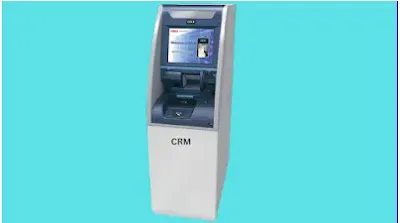A Cash Recycling Machine (CRM) is a type of automated banking technology that combines features of both an ATM (Automated Teller Machine) and a cash deposit machine. Unlike a traditional ATM, which primarily dispenses cash, a Cash Recycling Machine is designed to accept, verify, and recycle deposited cash.
Cash Deposit:
Cash Recycling: Instead of storing the cash for withdrawal by other users, a Cash Recycling Machine takes the verified cash and recycles it for future withdrawals. It keeps the deposited cash within the machine, allowing it to be used for dispensing cash to other users who want to withdraw money.
Cash Withdrawal: Cash Recycling Machine (CRM): Users can withdraw cash from the machine, and the withdrawn amount is deducted from the recycled cash stored in the machine. The main advantage of Cash Recycling Machines is their ability to optimize cash handling for banks and financial institutions. They help reduce the need for frequent cash replenishment and enable more efficient use of cash by recycling it within the machine. This can lead to cost savings for banks and provide customers with a convenient way to deposit and withdraw cash. These machines are often equipped with advanced security features to ensure the safety and integrity of deposited and recycled cash. Cash Recycling Machines are commonly used in banking environments, providing a self-service option for customers while improving operational efficiency for financial institutions. Cash Recycling Machine (CRM)
Type of Cash Recycling Machine: Cash Recycling Machines come in various types and models, each designed to meet specific banking and financial needs. Here are some common types of Cash Recycling Machines.
Full-Function Cash Recycling Machines: These machines offer a comprehensive range of functions, including cash deposit, withdrawal, and recycling. Users can deposit cash, and the machine verifies, counts, and stores the cash for future withdrawals.
Cash Deposit Machines with Recycling: Some machines focus primarily on cash deposit functionality but incorporate recycling features. Users deposit cash, and the machine verifies and recycles the deposited cash for subsequent withdrawals.
Teller Cash Recyclers: Teller Cash Recyclers are designed for use by bank tellers in the branch. They automate many cash handling tasks, allowing tellers to focus on customer service rather than manual counting and sorting of cash.
Stand-Alone Cash Recyclers: These machines are independent units that customers can use for both depositing and withdrawing cash without the need for direct interaction with bank staff.
ATMs with Cash Recycling Capability: Some ATMs are equipped with cash recycling features, allowing users to deposit cash directly into the ATM, and the machine recycles the deposited cash for subsequent withdrawals.
Smart Cash Recycling Machines: Modern cash recyclers may be equipped with advanced technology, such as touchscreens, biometric authentication, and real-time connectivity to the bank's systems.
Compact Cash Recyclers: These are smaller-sized cash recyclers suitable for locations with limited space, such as small bank branches or retail environments.
Customizable Cash Recyclers: Some machines allow banks to customize settings based on their specific needs, such as cash denomination sorting, transaction limits, and reporting features. It's important to note that the features and capabilities of Cash Recycling Machines can vary between manufacturers and models. These machines play a crucial role in improving the efficiency of cash handling processes for banks and providing convenient services for customers.
Benefit of Cash Recycling Machine: Cash Recycling Machines (CRMs) offer several benefits to both banks and customers, contributing to increased efficiency, security, and convenience in cash handling. Here are some key benefits of Cash Recycling Machines:
Operational Efficiency: CRMs automate cash handling processes, reducing the manual effort required for counting, sorting, and reconciling cash. They streamline cash management tasks for bank staff, freeing up time for more customer-focused activities.
Cost Savings Cash Recycling Machine (CRM): By recycling deposited cash for withdrawals, CRMs help reduce the need for frequent cash replenishment and transportation, leading to cost savings for banks. The automation of cash-related tasks can also result in lower operational costs.
Improved Cash Flow: Cash Recycling Machines contribute to better cash flow management for banks by optimizing the use of deposited cash for withdrawals. They help maintain an adequate cash supply in the machine, reducing instances of cash shortages or excess cash accumulation.
Enhanced Security: CRMs often come equipped with advanced security features, such as counterfeit detection and secure storage. The reduced manual handling of cash minimizes the risk of errors and potential security breaches.
Customer Convenience: Cash Recycling Machines provide customers with a self-service option for both cash deposits and withdrawals. Users can perform transactions at their convenience, even outside of regular banking hours.
Faster Transactions: Automated cash handling in CRMs speeds up transactions compared to manual processing, leading to shorter wait times for customers. This is particularly beneficial in high-traffic areas, such as busy bank branches or retail locations.
Reduction in Cash Handling Errors: Automation reduces the likelihood of errors in cash handling, such as miscounts or misplacements of currency. Accurate counting and verification processes contribute to more reliable and error-free transactions.
Environmentally Friendly: The recycling aspect of CRMs contributes to environmental sustainability by minimizing the need for additional printing of new banknotes. Reduced cash transportation can also have positive environmental implications.
Integration with Banking Systems: Cash Recycling Machines are often integrated with a bank's core banking system, allowing for real-time updates and accurate reconciliation. This integration enhances overall operational efficiency and reporting capabilities.
Customization and Flexibility: Many CRMs offer customizable settings to meet the specific needs of individual banks, including cash denomination sorting, transaction limits, and reporting features.
Overall, Cash Recycling Machines play
a vital role in modernizing and optimizing cash management processes for
financial institutions, contributing to a more secure, efficient, and
customer-friendly banking experience.
